Benjamin Wilburn McDonnold, D.D., LL.D. (March 24, 1827- February 27, 1889) was a Presbyterian minister, writer and educator. He was the third President of Cumberland University, and wrote the History of the Cumberland Presbyterian Church.
Benjamin Wilburn McDonnold was born in Overton County, Tennessee and raised on a farm. He exhibited a strong religious turn of mind from a young age, likely inspired by his mother, Martha. He began preparing to become a minister at age 12, attaining candidacy at age 16. Around this time, it is said that he memorized and could recite the entire New Testament. He attended college at Cumberland College in Princeton, Kentucky, graduating in 1849.
He became Professor of Mathematics at Bethel Seminary, and later at Bethel College. When the college closed during the Civil War he became pastor of the Presbyterian Church at Lebanon, Tennessee, and for a time a chaplain in the Confederate army.
After the war, he accepted a position to teach at the re-opened Cumberland University. Near the end of 1866, he was named the third President of the university, taking over for recently named President Anderson, who resigned due to poor health. This was a very difficult time for the school, which had virtually no money, buildings or students remaining after the war. His hard work alongside the trustees helped the school to re-establish itself, and by 1870–71, 335 students were attending the university.
In failing health, he resigned the Presidency in 1873. After a time of rest his health returned, and he spent time evangelizing in such places as Texas, California and Pennsylvania. He was requested by the Cumberland Presbyterian Church Board of Publication to write the History of the Cumberland Presbyterian Church, which he did.
He died at his home in Lebanon, Tennessee on February 27, 1889 (age 62).

The Cumberland Presbyterian Church is a Presbyterian denomination spawned by the Second Great Awakening. In 2019, it had 65,087 members and 673 congregations, of which 51 were located outside of the United States. The word Cumberland comes from the Cumberland River valley where the church was founded.
Bethel University is a private Cumberland Presbyterian-affiliated university in McKenzie, Tennessee with satellite campuses in Jackson, and Paris. It is accredited to award degrees up to the master's level.

Cumberland University is a private university in Lebanon, Tennessee. It was founded in 1842. The oldest campus buildings were constructed between 1892 and 1896.
Memphis Theological Seminary is an ecumenical seminary of the Cumberland Presbyterian Church in Memphis, Tennessee. Although it is affiliated with the Cumberland Presbyterian Church, it accepts and trains ministerial candidates from other denominations as well. Besides the traditional Master of Divinity (MDiv), Memphis Theological Seminary also grants the Master of Arts in Christian Ministry (MACM) with concentrations in Social Justice, Christian Education, and Chaplaincy, as well as the Doctor of Ministry (DMin). It also administers the Cumberland Presbyterian denomination's Program of Alternate Studies or PAS.

Robert Looney Caruthers was an American judge, politician, and professor. He helped establish Cumberland University in 1842, serving as the first president of its board of trustees, and was a cofounder of the Cumberland School of Law, one of the oldest law schools in the South. He served as a Tennessee state attorney general in the late 1820s and early 1830s, and was a justice of the Tennessee Supreme Court in the 1850s and early 1860s. He also served one term in the United States House of Representatives (1841–1843). In 1863, he was elected Governor of Tennessee by the state's Confederates, but never took office.
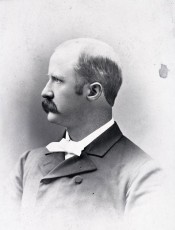
Walter Quincy Scott was an American educator who was the second President of Ohio State University and the fifth principal of Phillips Exeter Academy.
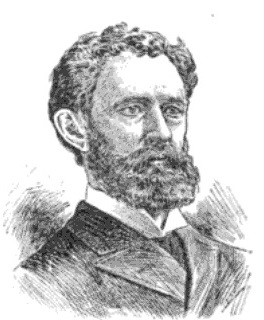
Benjamin Augustine Enloe was an American politician and a member of the United States House of Representatives for the 8th congressional district of Tennessee.
William T. Ingram (1913–2001) was an American theologian. He served as the first President of Memphis Theological Seminary from 1964 to 1978.
Franceway Ranna Cossitt was an early minister in the Cumberland Presbyterian denomination of Christianity. He was also the first stated clerk of the Cumberland Presbyterian General Assembly in 1829. He was also the founder of Cumberland College in Princeton, Kentucky, in 1825, which was eventually moved to Lebanon, Tennessee, in 1843, to become Cumberland University. The name Franceway Ranna was a frontier corruption of François-René.
Samuel Doak (1749–1830) was an American Presbyterian clergyman, Calvinist educator, and a former slave owner in the early movement in the United States for the abolition of slavery.
Cumberland College in Princeton, Kentucky, was founded in 1826 and operated until 1861. It was the first college affiliated with the Cumberland Presbyterian Church. In 1842, the Cumberland Presbyterian denomination withdrew its support from Cumberland College in favor of Cumberland University in Lebanon, Tennessee. In doing so, the denomination intended to simply relocate the school from Princeton to Lebanon, but Cumberland College remained open without denominational support until the Civil War.

Robert Hamilton Bishop was a Scottish-American educator and Presbyterian minister who became the first president of Miami University in Oxford, Ohio. A professor of history and political science, he wrote about the history of the early churches in the United States, as well as theology.
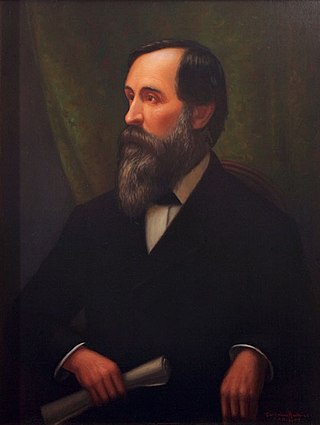
John Berrien Lindsley (1822–1897) was an American Presbyterian minister and educator in Nashville, Tennessee.

Andrew Wylie was an American academic and theologian, who was president of Jefferson College (1811–1816) and Washington College (1816–1828) before becoming the first president of Indiana University (1829–1851).

John McMillan was a prominent Presbyterian minister and missionary in Western Pennsylvania when that area was part of the American Frontier. He founded the first school west of the Allegheny Mountains, which is now known as John McMillan's Log School. He is one of the founders of Washington & Jefferson College.
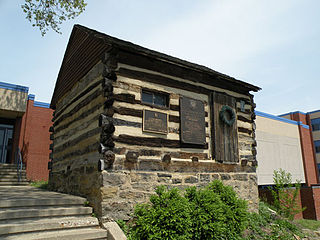
The history of Washington & Jefferson College begins with three log cabin colleges established by three frontier clergymen in the 1780s: John McMillan, Thaddeus Dod, and Joseph Smith. The three men, all graduates from the College of New Jersey, came to present-day Washington County to plant churches and spread Presbyterianism to what was then the American frontier beyond the Appalachian Mountains. John McMillan, the most prominent of the three founders because of his strong personality and longevity, came to the area in 1775 and built his log cabin college in 1780 near his church in Chartiers. Thaddeus Dod, known as a keen scholar, built his log cabin college in Lower Ten Mile in 1781. Joseph Smith taught classical studies in his college, called "The Study" at Buffalo.
Claude Clossey Williams (1895–1979) was a Presbyterian minister active for more than 50 years in civil rights, race relations, and labor advocacy. He worked with the Southern Tenant Farmers Union, founded the People's Institute for Applied Religion, and served as the national vice president of the American Federation of Teachers. He was also the director of Commonwealth College in Mena, Arkansas, from 1937–1939.
The Revival of 1800, also known as the Red River Revival, was a series of evangelical Christian meetings which began in Logan County, Kentucky. These ignited the subsequent events and influenced several of the leaders of the Second Great Awakening. The events represented a transition from British traditions to innovations arising from the unique needs and culture of Americans in the new century, especially on the frontier. The startling manifestations of revival fervor that first occurred in June 1800 at the Red River Meeting House, a small Presbyterian congregation led by James McGready, began as a Scottish sacrament service, but led to the important innovation of serial religious services later known as camp meetings.
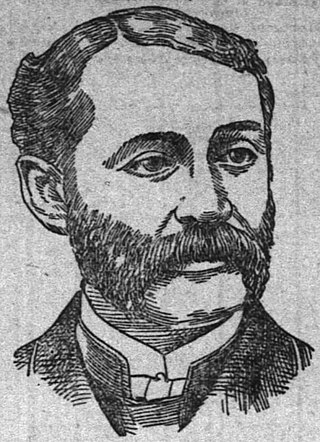
James Matthew Townsend was an African Methodist Episcopal (AME) minister and a state legislator from Indiana. A Republican, he served in the legislature in the 1884 session. From 1889 to 1891 he was recorder at the General Land Office in Washington, D.C., appointed by President Benjamin Harrison.
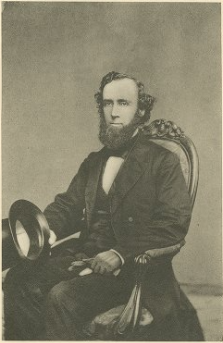
George Wilson McPhail was an American Presbyterian minister and educator who served as the sixth president of Lafayette College, a director at Princeton Theological Seminary, and the fifth president of Davidson College.